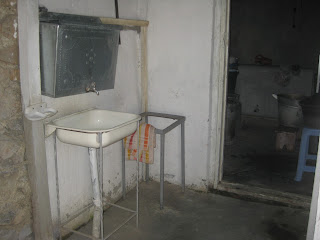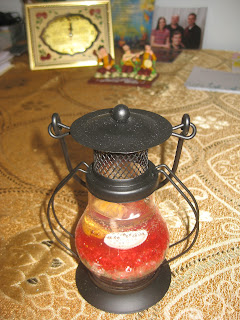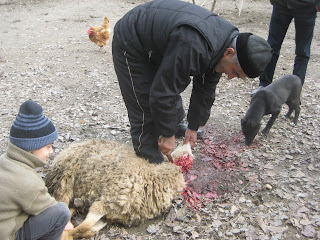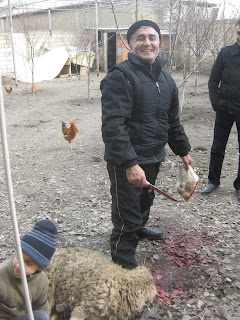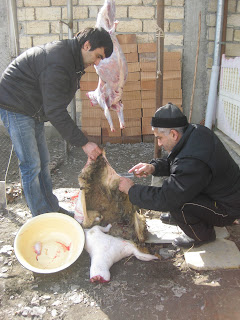Trip to Oğuz and Şəki…or How I (Almost) Saw Russia from the Back Porch…last weekend.
The ‘back porch’ of Azerbaijan overlooks the countries of Russia and Georgia-- that is if you could see beyond the towering peaks of the Caucasus Mountains. The Caucasus divide East from West, Europe from Asia (like the Urals), and from which the term ‘Caucasian’ is derived. What glorious settings the towns of Oğuz and Şeki occupy!
The first adventure was to the town of Oğuz. I departed by small bus (marshrutka-like) at 8 am, which follow a rugged but breathtakingly beautiful route into the heart of the mountains. We passed small villages with small stone houses behind their small stone walls lining rugged, stone-filled, muddy paths; we passed open fields and valleys with sweeping views of the mountains in the background; and we passed the occasional shepherd leading his flock, as well as grazing yaks and cattle. I must be getting used to these rides—I was hardly fazed by how cramped and crowded they are, fitting in as many people as possible. However, good thing I got to the bus station early enough to grab a seat, otherwise the 2-hour ride to Oğuz might have been just a bit too adventuresome, had I needed to stand the whole way. This particular route follows what is supposed to be a two-lane road, but it is so full of washed-out areas and huge pot-holes that the bus driver must proceed slowly with caution (good thing!) and swerve from one side of the road to another, just to find a decent surface to drive on…and so did the on-coming cars, too, which made it seem at times like a one-lane road, with cars heading straight for us (and us towards them). Oh, the adventure of it all! And since we were climbing closer and closer towards the mountains, the engine made very funny noises, indicating that perhaps our marshrutka was a bit too over-loaded for the climb, despite the down-shifting. At one particularly steep point an on-coming car stopped our driver for directions; after obliging, the driver had a moment where it didn’t seem like our rickety bus was going to be able to get going again. Well, we did, and soon I found myself in the little town of Oğuz. It reminded me of little towns in the Rockies, so gorgeous. After getting directions to the Olympic Complex of the town, I met up with other Peace Corps Volunteers for the youth Frisbee camp and tournament. I even tossed the Frisbee around some, too, inside a huge gymnasium (but surprisingly NO basket-ball hoops or courts in this gym). But I mainly participated in spurring on the other PCV’s and Azerbaijani youth in their games. The team from Oğuz was spectacular, and they won!
Road as seen from the mini-bus (marshrutka)
My PCV friend Kathy and I decided it was about time to head to Şeki, which is about an hour further towards Georgia from Oğuz, and which is where she is spending her PCV assignment. But first we joined up with another PCV Stephan and LCF Tural for a hike to a hill-topped abandoned pilgrimage chapel, most likely an Albanian Caucasus Christian Orthodox church, now in semi-ruined state. Nonetheless, followers still come and leave red wish-ribbons tied to the tree by the door, believing that when they blow away in the wind, the wish will come true. Interesting also is the fact that Oğuz has two synagogues, one still active with a congregation…this is a region of ethnic Udi (Christians) and of so-called Mountain Jews, which have co-existed here for centuries. Oguz
Ancient Udi pilgrimage chapel
Red ribbons tied to branches on tree at right of little church represent wishes, which 'come true' when the wind blows them away
View in Sheki
I loved staying in Şeki. Kathy lives with a wonderful host family in a centuries-old house, not far from the Caravansaray (the over-night stopping place for those riding along the Silk Road with their camel caravans centuries ago), which today has been converted into a hotel in which to stay, just as in the days of old. Also centuries-old, is the spectacular Khan Palace further up the hill-side, so marvelous in its design, with beautiful colored windows and walls. Many scenes on the walls depicted trees of pomegranates, thought to be the fruit of kings, because they are topped with little crowns—look for that, the next time at the grocery store. Şeki has steep and winding cobble-stoned lanes and alleys, so charming, but also still a bit treacherously packed with snow and ice. (Mingechavir’s weather, being much milder, has not had snow or ice for several weeks, but I forgot about Sheki’s mountain location, and didn’t think to bring the right boots—ah, well…) The house in which Kathy lives is truly interesting…like many centuries-old homes in Europe, the doors are small and low—so much so, that even I, small-statured as I am, had to duck in the door-ways! The squat-toilet is outside, built into the stone wall of the yard; there is a sink to wash near the outdoor bucket-bath bathing room, but that sink wasn’t usable, since the water in the small metal reservoir above the single spigot, was frozen. So you wash and brush teeth in the kitchen, which also has a single spigot faucet below a metal tank, which holds the water (cold!). To get to the bedrooms, you go outside and up some stairs, and walk across a veranda to the several bedrooms. Each bedroom, as well as the living room, has a small gas furnace, which in earlier days might have been a wood-burning stove. The mom in Kathy’s host family is delightful and genuinely hospitable. Before İ left, she pointed us in the right direction for the shop with the best halva—the local pastry specialty, a fancy version of baklava and most tasty! I had a great time, but also made a work-related connection with Kathy’s Azerbaijani counterpart, to possibly in the future work on ways to help advance the English instruction in the orphanage and internat that his non-profit organization helps support. It was a wonderful, worthwhile weekend in many ways.
Road to Kathy's work-place
Exploring the Caravansaray
The Palace of the Khan
Kathy's house in Sheki
Kitchen...no running water inside the house, tank above sink holds water filled by bucket, turn faucet on spigot when needed
Hall-way
View of courtyard from balcony (veranda); red door in background is for the toilet room
From the balcony
Washroom in corner of court-yard/bucket bathroom, sink with tank-reservoir
Kathy's house in Sheki


























